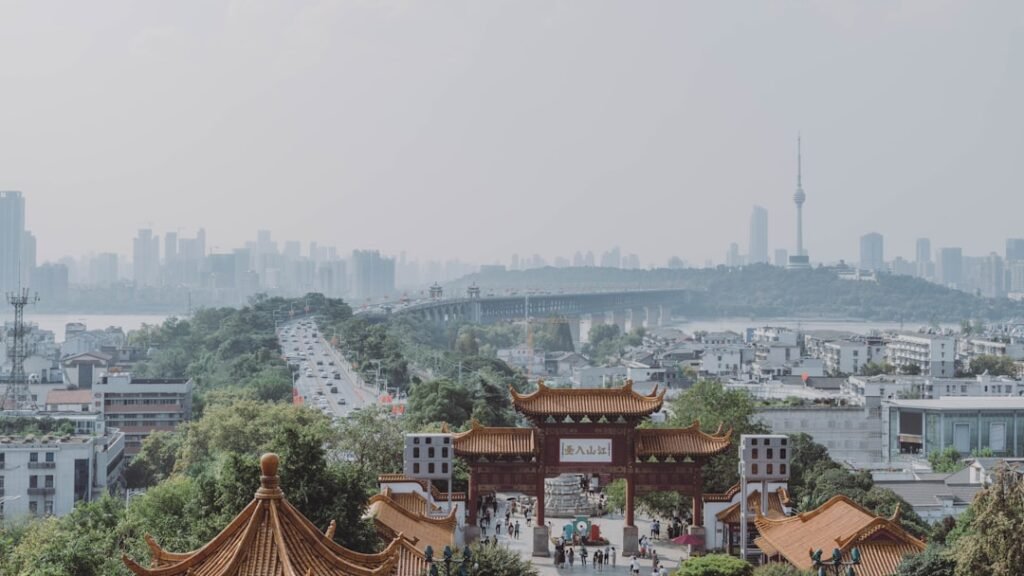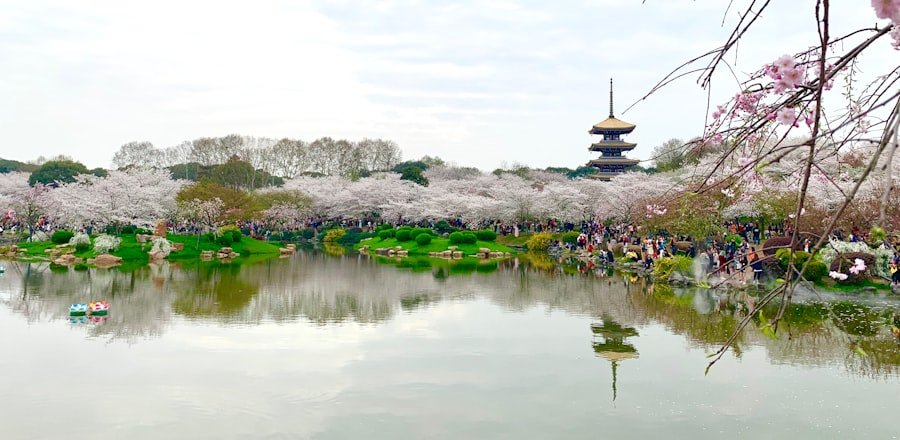

Chinese for Tourists: How to Talk About Famous Landmarks
As the world becomes increasingly interconnected, the allure of travel to diverse destinations has never been more appealing. Among these, China stands out as a country rich in history, culture, and breathtaking landscapes. For tourists venturing into this vast nation, learning a few basic phrases in Mandarin can significantly enhance their experience.
Not only does it facilitate communication, but it also demonstrates respect for the local culture, fostering a deeper connection with the people and places one encounters. This article aims to equip travellers with essential Mandarin phrases and cultural insights that will make their journey through China more enjoyable and immersive. Understanding the language can open doors to unique experiences that might otherwise remain inaccessible.
From bustling markets to serene temples, speaking even a little Mandarin can transform a simple interaction into a memorable exchange. Whether you are exploring the vibrant streets of Beijing or the tranquil gardens of Suzhou, knowing how to communicate in Mandarin will enrich your travel experience and allow you to engage more meaningfully with the local culture. Start learning Chinese at the NLS Norwegian Language School in Oslo now!
Table of Contents
ToggleSummary
- Chinese language can be a valuable tool for tourists visiting China, allowing for better communication and cultural immersion.
- Learning basic Mandarin phrases such as greetings, numbers, and simple questions can greatly enhance the travel experience in China.
- Being able to talk about famous landmarks in Chinese can help tourists navigate and appreciate the rich history and culture of the country.
- Knowing how to ask for directions in Chinese is essential for getting around and exploring different attractions in China.
- Ordering food and drinks in Chinese can make dining experiences more enjoyable and authentic for tourists in China.
Basic Mandarin Phrases for Tourists
To navigate through China effectively, tourists should familiarise themselves with some fundamental Mandarin phrases. Greetings are an excellent place to start; saying “Nǐ hǎo” (你好) means “Hello,” while “Xièxiè” (谢谢) translates to “Thank you.” These simple expressions can go a long way in establishing rapport with locals. Additionally, learning how to say “Zài nǎlǐ?” (在哪里?) which means “Where is…?” can be incredibly useful when seeking directions or specific locations.
Another essential phrase is “Wǒ yào…” (我要…), meaning “I want…”. This phrase can be particularly handy when ordering food or shopping. For instance, if you wish to order a cup of tea, you would say “Wǒ yào yī bēi chá” (我要一杯茶).
By mastering these basic phrases, tourists can navigate their surroundings with greater confidence and ease, making their travels more enjoyable.
Talking about Famous Landmarks in Chinese

China is home to numerous iconic landmarks that attract millions of visitors each year. Being able to discuss these sites in Mandarin can enhance your travel experience. For example, the Great Wall of China is known as “Chángchéng” (长城), which translates directly to “Long Wall.” When visiting this monumental structure, you might express your awe by saying, “Zhège chángchéng hěn měi!” (这个长城很美!), meaning “This Great Wall is beautiful!” Another famous landmark is the Forbidden City, referred to as “Zǐjìnchéng” (紫禁城).
When discussing its historical significance, you could say, “Zǐjìnchéng shì yī zuò hěn zhòngyào de lìshǐ jiànzhú” (紫禁城是一座很重要的历史建筑), which means “The Forbidden City is a very important historical building.” By learning how to talk about these landmarks in Mandarin, tourists can engage more deeply with their surroundings and share their experiences with fellow travellers.
How to Ask for Directions in Chinese
Navigating a new city can be daunting, but knowing how to ask for directions in Mandarin can alleviate some of that stress. A useful phrase is “Qǐng wèn, … zěnme zǒu?” (请问,…怎么走?), which means “Excuse me, how do I get to…?” You can fill in the blank with your desired destination.
For instance, if you want to find a nearby restaurant, you would say, “Qǐng wèn, cāntīng zěnme zǒu?” (请问,餐厅怎么走?). Additionally, understanding directional terms can be beneficial. Words like “zuǒ” (左) for “left,” “yòu” (右) for “right,” and “zhí zǒu” (直走) for “go straight” will help you follow instructions given by locals.
By mastering these phrases and terms, tourists can confidently navigate their way through bustling cities and rural areas alike.
Describing Famous Landmarks in Chinese
When visiting famous landmarks, being able to describe them in Mandarin adds depth to your experience. For instance, if you are at the Terracotta Army in Xi’an, you might say, “Terracotta jūn shì yī zhǒng hěn yǒumíng de lìshǐ jīngjù” (兵马俑是一种很有名的历史遗迹), meaning “The Terracotta Army is a very famous historical site.” This not only shows your appreciation for the site but also allows you to share your thoughts with others who may be interested. Moreover, expressing your feelings about a landmark can create memorable interactions.
If you find the scenery breathtaking, you could say, “Zhège fēngjǐng hěn zhēn měi!” (这个风景真美!), which translates to “This scenery is truly beautiful!” Such expressions can lead to engaging conversations with locals or fellow travellers who share your enthusiasm for the wonders of China.
Ordering Food and Drinks in Chinese

One of the highlights of travelling in China is undoubtedly the food. Being able to order meals and drinks in Mandarin not only enhances your culinary experience but also allows you to explore local flavours more authentically. A fundamental phrase is “Wǒ xiǎng yào…” (我想要…), meaning “I would like…”.
For example, if you wish to order dumplings, you would say, “Wǒ xiǎng yào jiǎozi” (我想要饺子). Additionally, knowing how to specify your preferences can be beneficial. If you prefer spicy food, you could say “Wǒ xǐhuān là de” (我喜欢辣的), meaning “I like spicy food.” Understanding how to navigate menus and communicate your desires will not only make dining out easier but also allow you to savour the rich culinary heritage that China has to offer.
Common Cultural Etiquette for Tourists in China
Cultural etiquette plays a significant role in ensuring a positive experience while travelling in China. One important aspect is greeting people appropriately; a polite handshake is common among acquaintances. However, it is customary to bow slightly when greeting elders as a sign of respect.
Additionally, when receiving gifts or business cards, it is considered polite to use both hands. Another crucial etiquette point is table manners during meals. It is customary for the host to serve food and pour drinks for guests as a sign of hospitality.
When dining out, it is polite to wait for the host or elder to start eating before you begin your meal. Understanding these cultural nuances will not only help tourists avoid unintentional faux pas but also foster goodwill with locals.
Using Public Transport in China
China boasts an extensive public transport system that includes buses, subways, and trains. Familiarising oneself with basic phrases related to public transport can greatly enhance a tourist’s ability to navigate cities efficiently. For instance, knowing how to ask about ticket prices is essential; you can say “Zhège piào duōshǎo qián?” (这个票多少钱?), meaning “How much is this ticket?” When using the subway system, understanding station names and directions is crucial.
A helpful phrase is “Wǒ yào qù…” (我要去…), which means “I want to go to…”. By combining this with the name of your destination station, you can easily communicate your travel plans. Mastering these phrases will empower tourists to explore cities independently and confidently.
Tips for Bargaining in Chinese Markets
Shopping in local markets is an integral part of experiencing Chinese culture; however, bargaining is often expected. Knowing how to negotiate prices in Mandarin can make this experience more enjoyable and successful. A common phrase used during bargaining is “Tài guì le!” (太贵了!), which means “It’s too expensive!” This expression signals that you are looking for a better price.
Additionally, it’s helpful to know how to express your desired price: “Wǒ kěyǐ mǎi yī gè…?” (我可以买一个…?), meaning “Can I buy one for…?” By confidently engaging in bargaining using these phrases, tourists can not only secure better deals but also immerse themselves in the vibrant market culture.
Emergency Phrases for Tourists in China
While travelling can be an exhilarating experience, it’s essential to be prepared for emergencies. Knowing key phrases in Mandarin can be invaluable during such situations. For instance, if you find yourself needing assistance, saying “Qǐng bāngzhù wǒ!” (请帮助我!) translates to “Please help me!” This phrase can alert locals that you require immediate assistance.
In case of medical emergencies, knowing how to say “Wǒ bù shūfu” (我不舒服), meaning “I am not feeling well,” can help convey your condition effectively. Additionally, having the phrase for calling emergency services—”Yāo jǐngchá” (要警察), meaning “Call the police”—can be crucial if you find yourself in a dangerous situation. Being equipped with these emergency phrases ensures that tourists can seek help when needed.
Making the Most of Your Trip to China
In conclusion, learning basic Mandarin phrases and understanding cultural nuances significantly enriches the travel experience in China. From ordering food and asking for directions to engaging with locals and navigating public transport, these skills empower tourists to explore the country with confidence and ease. Moreover, being respectful of cultural etiquette fosters goodwill and enhances interactions with the local population.
For those eager to delve deeper into the language and culture of China before embarking on their journey, enrolling in Chinese courses at the NLS Norwegian Language School in Oslo could be an excellent option. The school offers tailored programmes designed for beginners and travellers alike, providing essential language skills that will undoubtedly enhance any trip to China. By investing time in learning Mandarin at NLS, tourists can ensure they make the most of their adventures in this fascinating country while forging meaningful connections along the way.
Register for a Chinese class at the NLS Norwegian Language School now!
If you want to learn Norwegian, you can register for classes here. We look forward to hearing from you and helping you become fluent in Norwegian.





